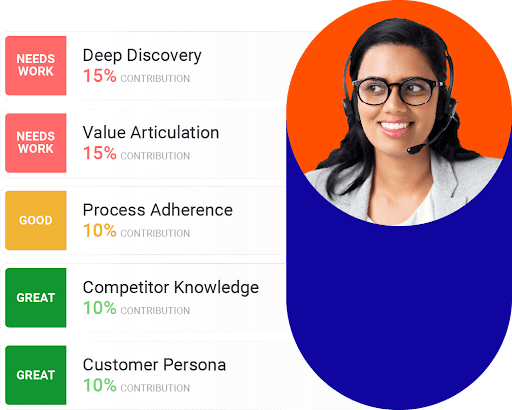On every sales team, there are high performers and low performers. Then, there are the folks who fall somewhere in between.
Often, revenue leaders resign themselves to the fact that a small group of top performers will always drive the lion’s share of sales. But it doesn’t have to be that way.
Your top performers are those who have mastered the top sales skills they need for success. Once you identify those top sales skills, you can deliver training, coaching, and enablement that helps every rep build the competencies and behaviors needed to crush quota every quarter.
But what are the top sales skills for revenue teams?
Recently, we asked a group of revenue leaders what their teams’ top sales skills are. Based on their feedback, we’ve compiled a list of the seven top sales skills every rep needs for success.
1. Product knowledge
Sales reps need up-to-date product knowledge to answer prospects’ questions, address competitor comparisons, and run confident demos. David Bitton, co-founder at DoorLoop, explained it as:

The more your sellers know about your product, the better they’ll be able to tailor a demo or sales presentation to each prospect’s particular needs or challenges. “You must know your product inside and out,” said Freya Ward, global sales director at Headley Media. “You need to be able to deal with any questions a client may raise and handle any potential objections they may have with confidence. You also need to understand exactly how the product will help the customer and why it is they need it,” she added.
Run dedicated training sessions with your product team when you launch product updates or new features. These will allow your reps to get hands-on experience with your product and learn how to use it in a structured setting. Then run short quizzes to test their knowledge about your new features and virtual role-plays or practice demos to check that they are ready to present your new products to potential customers.
2. Active listening
Active listening helps sellers strengthen their rapport with customers. Cayla Thurman, business reputation consultant at Rize Reviews, explained, “Active listening is all about staying in the moment and making sure that you understand what the buyer is saying. You can rephrase what the buyer just said, verify if you got the message correctly, or slow the conversation down to ensure that you are perceived as an effective sales consultant.”
As well as helping build customer relationships, active listening is important for companies that take a more consultative approach to sales. This is the case for Frontify, and Stephanie McSwiney, their VP of sales, told us:

You can assess reps’ active listening skills by reviewing call recordings, listening back, or reading call transcripts. You want to see a good split in the talk time, with prospects talking more than your sellers. You can also look for key questions or phrases, such as, “Did I understand that correctly?” or “Have I got that right?” These questions demonstrate that a rep actively engages with what a prospect tells them.
3. Prospecting
Sales development reps (SDRs) need strong prospecting skills to find and reach out to good-fit potential customers, so they can maintain a healthy sales pipeline and hit quota. According to Salesforce , sales professionals spend about 9% of their time each week researching their prospects.
This might,” include seeking information about the company and looking up decision-makers on social media platforms like LinkedIn. Thurman explained:

Using a revenue enablement platform like Mindtickle helps you provide AI-powered training and coaching for your reps. We found that cold email intros are the top use case for written role-plays in the Mindtickle platform as reps work to develop their prospecting and outreach skills.
4. Negotiating
Negotiation is important for keeping deals moving forward and overcoming potential objections and blockers to closing deals. Tim Clarke, director of sales and marketing at SEOblog.com, explained, “A sales representative should have solid negotiation skills to create a tailored experience for their customers, helping [customers] get the products or services they want while also ensuring that their company benefits from their customers’ decisions.”
Nina Pączka, community manager at Zety, has a clear idea of what reps with strong negotiation skills look like. She believes that:

You can assess your reps’ negotiation skills by listening to their call recordings for later-stage sales conversations with prospects. Alternatively, your reps can run practice calls with their peers to see how their colleagues approach negotiation, learn from each other, and identify negotiation tactics that work in real selling scenarios.
5. Identifying and understanding customer needs
Reps need to identify the challenges customers face and understand what they want from a product like yours. Otherwise, they won’t be able to show how your product will meet customer needs and resolve their pain points. “A good salesperson has to be able to listen to clients and understand their needs rather than just jumping in with a sales pitch,” said Ward.
To understand customer needs, sellers need to ask thoughtful, relevant questions. Ng Jiong Han, CSO at Novocall, said, “The ability to ask the right questions is an essential skill. It’s important because SDRs understand and magnify prospects’ problems by asking the right questions. With this, they can easily position themselves to help prospects solve their problems without being pushy.”
Aneet Narang, Head of Global Revenue Enablement at PayPal, also understands the importance of identifying and understanding customer needs.

Once a seller understands customer needs well, they’re better equipped to deliver solutions and experiences that align with those needs. “A seller needs to have attention to detail and be able to manipulate data and identify patterns from multiple data streams to translate it into a story for buyers,” said Derrell James, CRO at Juniper Networks.
This is another area where reviewing call recordings can pay off. A conversation intelligence tool like Mindtickle’s Call AI can identify the main themes and topics covered on a call. You can also track mentions of specific keywords, such as common challenges or competitors.
6. Written and verbal communication
Soft sales skills like effective communication are just as important for sellers to master as hard skills. Clarke explained, “Salespeople must know how to communicate effectively throughout the sales cycle and be confident in speaking or presenting, whether through video conference or in person.”
Your reps’ communication skills affect relationship building and their ability to confidently explain your product’s benefits. Many companies think that verbal communication skills are necessary for sales reps but don’t look so closely at written communication. But email and outreach messages are a core part of the sales process. Poor written communication can create an unprofessional first impression and lead to missed opportunities for your team.
Some revenue leaders predict that sales reps will start to take ownership of inbound lead-generation campaigns and work more closely with marketing departments in the future. With that in mind, we wanted to bring in the perspective of demand generation.
Tristan Harris, demand generation marketing manager at Thrive Agency, agrees that communication skills are essential.

7. Coachability
Coachability is your reps’ ability to receive and act on feedback to develop and improve their skills. It can be the difference between a top-performing rep and a low-performing one.
Srikanth Pendyala, SDR team lead at Outplay, said, “Many sales leaders I talk to tell me how important it is for them to hire SDRs who are coachable. Yet there is no yardstick to measure that skill. So we bring an element of coaching into our interview process. No matter how good the rep is, if they are not ready to unlearn and learn new things, we do not make an offer.”
Krishna Saw, Director Digital Transformation & Adoption at Splunk also understands the importance of coachability.

An AI-driven sales coaching program can improve performance levels across your team, combining deal-specific coaching with more general skills training. It helps you personalize your coaching and training to focus on the individual skills and behaviors that each rep is struggling with, so they can make targeted improvements.
Document your team’s top sales skills in an ideal rep profile
Which skills are frequently displayed by the most successful salespeople at your organization? Once you’ve identified the skills, behaviors, and competencies that matter most to your business, document them in an ideal rep profile (IRP). You can then use your IRP in your hiring process to bring on new team members with the skills that will set them up for success.

Empower your sellers to master the skills that matter
Hiring great-fit sales reps is a good starting point. But while many buy into the myth that great sellers are born, not made, that’s not the case. Instead, when you identify the right sales skills, you can work to create an entire team of top-performing sales reps.
Once you’ve identified the top sales skills at your organization, you can measure each seller against this gold standard. You’ll identify the weaknesses of each seller, and you can use that insight to deliver targeted training, coaching, and enablement to close gaps.
Every member of your team will master top sales skills and be well-equipped to engage buyers and close deals.
Build a Stronger Sales Team with Mindtickle
Ready to see how Mindtickle can help you deliver targeted training, coaching, and enablement that ensures each seller can master the top sales skills they need to succeed?
Request Your DemoThis blog was originally published in May 2022 and updated in November 2024.



 By Helen Waite
By Helen Waite

 By Christian Pieper
By Christian Pieper